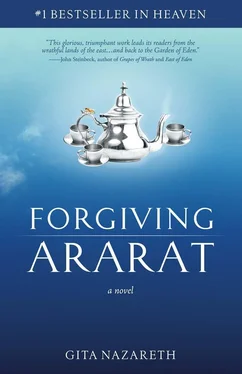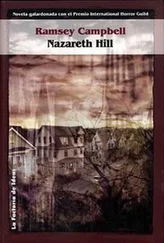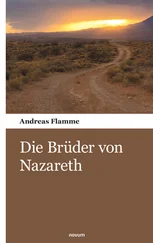Katerine’s father, Jared Schrieberg, and her younger brothers, Seth and Jacob, were industrious and immediately set to excavating a tunnel beneath the cabin through which to escape if anyone should approach. She told me they drilled their flight twice daily regardless of the weather and could silently vanish below the carefully reinstalled floorboards within thirty seconds exactly. They came and left from this tunnel, did most of their cooking at night to avoid attracting attention to the smoke from their fires, and relieved themselves far away from the cabin to avoid even the scent of habitation. It was a miserable and demeaning existence, and I felt sorry for them, but their precautions proved unnecessary. The very boldness of hiding on the property of a Waffen SS officer (the organization into which my uncle Otto accepted a commission) made life there secure for them in the way that life for certain tropical fish is made safe by living among lethal sea anemone.
When Katerine told her parents the news about Helmut, tears filled their eyes and they said they would sit shiva for him, which they explained to me was the Jewish mourning ritual. In my youth and ignorance, I panicked. I did not want them confusing God with their Jewish prayers into mistakenly sending Helmut to the Jews’ heaven. As politely as I could, I begged them not to do this. When they insisted, I grew furious. I had helped them at great personal risk and would not tolerate their interference in such matters. My grief for my brother and my hatred of his unseen murderers found an outlet in the Schriebergs, and I yelled at them in a voice more than loud enough to remind them upon whom they depended for their survival:
“ Beten Sie nicht Jüdisches für meinen Bruder! ”
The room fell silent. Katerine stared down at the floor, biting her lip as Frau Schrieberg dug her fingernails into Katerine’s arm. Seth and Jacob looked to their father in horror, expecting him to punish my impudence as he had so often done to them. But Herr Schrieberg only smiled coldly at me, revealing a flash of gold through his graying beard and mustache, unwittingly contorting his long, bulbous nose into the very caricature of a Jew mocked regularly in German newspapers of the day. As if surrendering a concealed weapon, he cautiously pulled the black yarmulke from the balding crown of his head and placed its flaccid shape before me on the battered plank table that served the family as dining area, desk, and altar. The Schriebergs would not offer prayers for my brother’s soul. I glared back at the old man and thanked him with a healthy dose of teenage smugness, having for the first time cowed an adult. He had no option. I left without another word and ran quickly through the woods, regretting my resort to such tactics but intoxicated by exerting my will so forcefully and effectively against my elders. The Schriebergs’ submission to my demands made me feel powerful and, for a moment, in control of the uncontrollable world around me. At least I didn’t have to live like them, like animals.
The skin has miraculously knitted itself over the amputation and the bandages have been removed, but even so, I refuse to touch or even look at the stump of my right arm. It terrifies me. Dr. Farris, the psychologist assigned to all amputees at Children’s Hospital, assures me this is perfectly normal.
“I’ve counseled many children in your situation, Brek,” he says. “Victims of firecrackers, car accidents, farm kids like you, too. Most react the same way. They think that what remains of their arms and legs are monsters poised to take what’s left of their bodies, but you must remember that this is the same arm you were born with. It’s been terribly injured and it needs your love and compassion. You’re all it’s got. Can you do that?”
“I’ll try, but it isn’t fair,” I cry.
Dr. Farris looks at his watch. “Oops, time’s up for today. I’ll see you next week, okay? I think you’re doing great.”
I find my mother reading a fashion magazine in the waiting room.
“Done?” she says.
“Yep.”
We run into Luas in the hallway outside Dr. Farris’ office. My mother doesn’t see him. Luas smiles and extends his left hand without first extending his right, pulling me with the gesture back into Nana’s living room in Shemaya.
“Sophia and I were beginning to wonder whether you would ever return,” Luas says.
I look around the room, dazed and confused by the flood of images, emotions, and personalities rushing through me. Nana brings me a cup of tea, and I sit down on the sofa.
“You’ve been spending a lot of time with Ms. Rabun,” Luas says. “She led an interesting life.”
I slide my hand into the right sleeve of my bathrobe and trace the familiar contours of my arm: the shrunken, atrophied bundle of biceps; the rough, calcified tip of humerus jutting like coral beneath a puffy layer of flesh capping the bone.
“Yes, yes she did,” I say.
“The Schriebergs lied, you know.”
“About what?”
“They sat shiva for Helmut.”
On the rainy afternoon of 23 April 1945, a Soviet scouting patrol advancing south toward Prague stumbles upon the Rabuns of Kamenz. It is the day of Amina Rabun’s eighteenth birthday celebration.
The Allies hold Leipzig to the west and the Russians are massed along the Oder to the east, making escape impossible. Amina’s father, Friedrich, and her uncle, Otto, had already pulled back to Berlin with the retreating remnants of Hitler’s forces but advised their families against leaving Kamenz, reasoning that the Russians were interested only in Berlin, that the western Allies would soon take Dresden, and that the armed forces of the latter were preferred to the former with respect to treatment of civilians. Privately, the Rabun brothers were also concerned for their affairs and property, which almost certainly would be looted if abandoned-if not by enemy soldiers then by their own German neighbors who have suffered such privation during Hitler’s desperate last stand.
Unaware of the approaching Russian forces, Amina rises early this day to begin baking for the party, but not before grossvater Hetzel, who has risen even earlier to slaughter a pig to roast in a pit dug several paces from the long garage full of polished Daimler automobiles owned by the Rabuns, the axles of which rest on thick wooden blocks because there is no fuel to run them. By noon, the sweet scent of pork, yams, cabbage, and fresh küchen tease aunt Helena ’s four hungry children, two boys and two girls, who have been playing hide-and-seek all morning despite a soft rain and their mother’s unwillingness, in anticipation of the feast, to prepare their usual hearty breakfasts. Sensitive to the effect displays of prosperity can have during such lean times, only family members have been invited to the party, all of whom, save those living in the manor, conveyed their regrets due to lack of transportation to the country. It is thus agreed that leftovers will be delivered to the hungriest of Kamenz by anonymous donation to the cathedral. Amina also plans secretly to smuggle a portion to the Schriebergs, who have enjoyed very little meat recently and, having long ago relaxed observance of Kosher laws in their cabin, will happily accept scraps of pork.
All goes merrily and well into the early afternoon, with everything and everyone cooperating except the weather. The soft rain becomes a downpour just as grossvater Hetzel is removing the pig from its pyre. Everybody races inside as much to stay dry as to enjoy the feast. They assemble in the formal dining room around a large table upon which has been arranged the finest place settings and two large hand-painted porcelain vases overflowing with bouquets of wildflowers freshly picked from the surrounding gardens. Colorfully wrapped gifts are arranged near the seat of honor at the head of the table, including several packages for the birthday girl delivered by special SS courier from Berlin. The anticipation builds until finally, with considerable ceremony, the grinning pig atop a tremendous silver platter makes its debut to ravenous applause. The browned head and body of the beast remain intact, resting peacefully in a soft bed of garnishes as if it has fallen asleep there. Toasts of precisely aged Johannisberger Rheingau are made first to Amina, then the cooks, and finally to the safe return of Friedrich and uncle Otto and, solemnly, a swift end to the war. A phonograph whispers Kreisler and Bach into the air. Amid the happy conversation, laughter, and music, the revelers cannot hear the Soviet patrol approaching and, therefore, have no opportunity to defend themselves or flee.
Читать дальше












